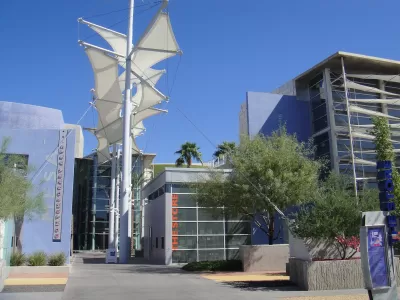Convention and arts centers are costly and lose lots of money, but cities still build and advocate for them.

Jen Fifield reports that cities across Arizona own event spaces that are expensive to build and manage and end up losing money. Mesa, Glendale, Phoenix, Tempe, and Scottsdale have public facilities whose bottom lines that have resulted in huge annual losses — from hundreds of thousands of dollars into the millions.
Cities make up the deficits through taxes and other funding. Some have turned over management to private companies or nonprofit organizations.
Arizona cities are willing to take a hit on these spaces because of what are seen as the larger benefits, says Fifield:
City officials across the Valley say looking simply at direct revenue the spaces bring in doesn't show the whole picture. The venues attract people to the city, who then spend money on food, travel and hotels. That outside revenue, city officials say, brings in more than enough to make up for the cost.
This phenomenon is not particular to Arizona. Cities across the country have ramped up construction of convention space, even when the cost is substantial and the demand is not apparent.
“[Heywood] Sanders has argued in academic papers and a book he wrote called ‘Convention Center Follies’ that although government officials always claim ancillary benefits from building, expanding and operating the spaces, they are expensive and rarely fulfill their promises,” says Fifield.
FULL STORY: Phoenix-area cities want to offer space for events, but they're all losing money doing it

Planetizen Federal Action Tracker
A weekly monitor of how Trump’s orders and actions are impacting planners and planning in America.

Maui's Vacation Rental Debate Turns Ugly
Verbal attacks, misinformation campaigns and fistfights plague a high-stakes debate to convert thousands of vacation rentals into long-term housing.

Restaurant Patios Were a Pandemic Win — Why Were They so Hard to Keep?
Social distancing requirements and changes in travel patterns prompted cities to pilot new uses for street and sidewalk space. Then it got complicated.

In California Battle of Housing vs. Environment, Housing Just Won
A new state law significantly limits the power of CEQA, an environmental review law that served as a powerful tool for blocking new development.

Boulder Eliminates Parking Minimums Citywide
Officials estimate the cost of building a single underground parking space at up to $100,000.

Orange County, Florida Adopts Largest US “Sprawl Repair” Code
The ‘Orange Code’ seeks to rectify decades of sprawl-inducing, car-oriented development.
Urban Design for Planners 1: Software Tools
This six-course series explores essential urban design concepts using open source software and equips planners with the tools they need to participate fully in the urban design process.
Planning for Universal Design
Learn the tools for implementing Universal Design in planning regulations.
Heyer Gruel & Associates PA
JM Goldson LLC
Custer County Colorado
City of Camden Redevelopment Agency
City of Astoria
Transportation Research & Education Center (TREC) at Portland State University
Jefferson Parish Government
Camden Redevelopment Agency
City of Claremont




























